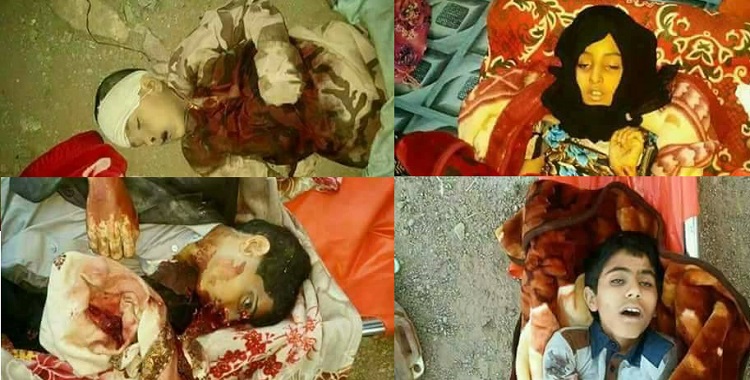www.aljazeerah.info
Opinion Editorials, February 2017
Archives
Mission & Name
Conflict Terminology
Editorials
Gaza Holocaust
Gulf War
Isdood
Islam
News
News Photos
Opinion Editorials
US Foreign Policy (Dr. El-Najjar's Articles)
www.aljazeerah.info
|
The Plight of 18.8 Million War-Torn Yemenis By Abdus Sattar Ghazali Al-Jazeerah, CCUN, February 13, 2017 |
 |
 |
|
|
US Navy Seal Killed, Several Injured in
a Raid on Al-Bayda, Which Killed 41 Yemenis, Including 8 Women and 8 Children, January 30, 2017 |
The United Nations and humanitarian organizations Wednesday (February 8) launched an international appeal for $2.1 billion to provide humanitarian assistance to 18.8 million Yemenis. This is more than two thirds of the total population of 27.4 million of the war-devastated Yemen. At least 12 million people in Yemen need life-saving assistance in 2017, the UN sources said.
“Two years of war have devastated Yemen… Without international support, they may face the threat of famine in the course of 2017 and I urge donors to sustain and increase their support to our collective response,” said UN Emergency Relief Coordinator Stephen O'Brien in a press release on the launch of the Humanitarian Response Plan for Yemen in Geneva.
“Humanitarian partners are ready to respond. But they need timely, unimpeded access, and adequate resources, to meet the humanitarian needs wherever they arise,” said Mr. O'Brien, who is also the Under-Secretary-General for Humanitarian Affairs.
He noted that since March 2015, violent conflict and disregard by all parties to the conflict for their responsibility to protect civilians have created a vast protection crisis in Yemen and millions of people face threats to their safety and basic human rights every day. In addition, deliberate war tactics are accelerating the collapse of key institutions and the economy, thereby exacerbating pre-existing vulnerabilities.
This has left an alarming 18.8 million people – more than two thirds of the population – in need of humanitarian assistance, according to the UN Office for the Coordination of Humanitarian Affairs, which also estimates that 10.3 million people are acutely affected and nearly 3.3 million people – including 2.1 million children – are acutely malnourished.
In 2016, 120 national and international partners including UN agencies and non-governmental organizations working out of humanitarian hubs in Aden, Al Hudaydah, Ibb, Sana'a, and Sa'ada assisted more than 5.6 million people with direct humanitarian aid, according to UN sources.
10,000 civilians killed in Yemen conflict
The Office for the Coordination of Humanitarian Affairs' Jamie McGoldrick said last month that the civilian death toll in the nearly two-year conflict has reached 10,000, with 40,000 others wounded.
This announcement marks the first time a U.N. official has confirmed such a high death toll in Yemen, the Arab world's poorest nation. Earlier, the U.N. reported 4,200 civilians were killed in the war.
In addition, many more are indirect victims of the conflict, including those who suffer from chronic diseases, including high blood pressure and diabetes, and are unable to get treatment, McGoldrick said. For example, a cancer clinic in Sanaa that used to treat 30,000 patients has closed, he said. Inevitably, those suffering from chronic disease "will die sooner than they should," he said.
The UN official also noted that more than 400,000 children under the age of five suffer from malnutrition, raising serious concern about their development and Yemen's future.
"This once more underscores the need to resolve the situation in Yemen without any further delay," U.N. deputy spokesman Farhan Haq said in New York. "There's been a huge humanitarian cost."
The Yemen conflict pits Houthis and allied forces against a Saudi-led coalition which is trying to re-install the government of Abed Rabbo Mansour Hadi. The coalition began brutal air strikes in March 2015 to restore Hadi's government that fled the country after Houthis seized the capital Sanaa in 2014.
US commando operation
The UN appeal for massive humanitarian assistance came days after a UN commando operation in Yemen in which one Navy SEAL was killed.
According to New York Post, the team was choppered in Saturday (Jan 28) to target a key al Qaeda headquarters in Yemen — the first U.S. strike in the region since 2014 — and ended up killing 14 militants, including senior leaders Abdulraoof al-Dhahab, Sultan al-Dhahab and Seif al-Nims, in an ensuing gun battle that lasted nearly an hour.
The SEAL’s famous Team 6 fled with a valuable cache — some of the militants’ laptops, cell phones and other material “that will likely provide insight into the planning of future terror plots,’’ US Central Command said.
Three American fighters were also wounded in the operation, including two when an Osprey, a tilt-rotor military aircraft, accidentally crash-landed during the raid.
The dead are said to include the 8-year-old daughter of Anwar al-Awlaki, the U.S.-born cleric who was killed in a 2011 U.S. drone strike, Washington Post said adding:
"The operation was launched under cover of darkness in the village of Yaklaa, a stronghold of al-Qaida in the Arabian Peninsula that was defended with land mines and guarded by heavily armed militants. A fierce firefight erupted. Wounded SEALs were evacuated for pickup by Marines flying on MV-22 Osprey aircraft from the USS Makin Island, an amphibious assault ship. One of the Ospreys was damaged badly enough in the rescue operation that U.S. military officials elected to destroy it with a GPS-guided bomb to make sure al-Qaida in the Arabian Peninsula wasn't able to exploit it."
Navy Capt. Jeff Davis, a Pentagon spokesman, and White House press secretary Sean Spicer disputed allegations, reported by Reuters and the New York Times, that the mission was poorly planned and had lost the element of surprise. The Times reported that the SEALs learned that their mission had been compromised after intercepting a transmission that showed the militants were preparing for their arrival. "We have nothing to suggest that this was compromised," Davis said, adding that report "does not match with reality."
Abdus Sattar Ghazali is the Chief Editor of the Journal of America (www.journalofamerica.net) email: asghazali2011 (@) gmail.com
***Share the link of this article with your facebook friends
|
|
|
|
||
|
||||||


